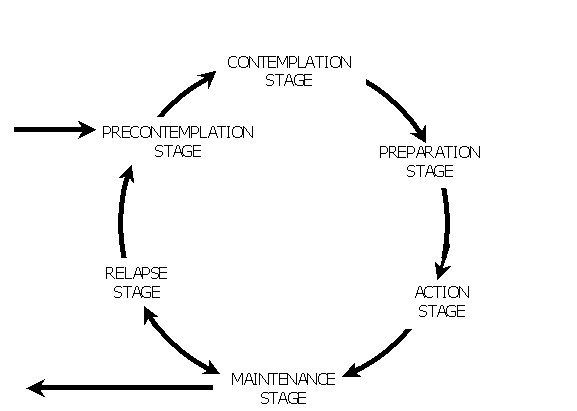Lessons
-
Section 1 - Core Fundamentals
-
Section 2 - The Core Challenge
-
Section 3 - Initiation Phase
-
Section 4 - Planning & Design Phase
-
Section 5 - Execution Phase
-
Section 6 - Monitor & Control Phase
-
Section 7 - Closure Phase
Change ReadinessWhen you're ready, nothing can stop you!
Starting an exercise program often requires a change in lifestyle and habits on the part of the individual. This is commonly known as 'behavioral change'. Unfortunately, many people change their habits in the short-term but do not persist with the change long enough for it to become a new behavior.
It's not easy to make a major change and make it stick. Following The Core Challenge, You may be more successful in keeping your resolutions by using the following steps.

|
In this stage, people are not thinking seriously about changing and are not interested in any kind of help. People tend to defend their current bad habit(s) and do not feel it is a problem. They may be defensive in the face of other people's efforts to pressure them to quit. |
||
|
In this stage people are more aware of the personal consequences of their bad habit and they spend time thinking about their problem. People are able to consider the possibility of changing, but they tend to be ambivalent about it. Many people remain in the contemplation stage for years. |
||
|
In this stage, people have made a commitment to make a change. But although those in the preparation stage are committed to action, and may appear ready, they have not necessarily resolved their ambivalence.. |
||
|
This is the stage where people believe they have the willpower to change their behavior and are actively involved in taking steps to change their bad behavior. Action is the most obviously busy period, and the one that requires the greatest commitment of time and energy. Changes made during the action stage are more visible to others than those made during other stages |
||
|
In the maintenance stage, you consolidate the gains you made in the action stage and work to prevent relapses. The goal of the maintenance stage is to maintain the new status quo. People in this stage tend to remind themselves of how much progress they have made. People in maintenance constantly reformulate the rules of their lives and are acquiring new skills to deal with life and avoid relapse. |
||
|
AIn any behavior change, relapses are a common occurrence. When you go through a relapse, you might experience feelings of failure, disappointment, and frustration. The key to success is to not let these setbacks undermine your self-confidence. If you lapse back to an old behavior, take a hard look at why it happened. Reaffirm your motivation, plan of action, and commitment to your goals - make plans for how you will deal with any future temptations. |
||
Note: If you need additional support, you can order The Core Challenge Kit.

"All things are ready, if your mind be so."
--William Shakespeare
MASTERMOVES
- Core
Training
Private Members Site
© 2020 OK Initiatives, Inc - All Rights Reserved